Publications
Below you can find publications of the DKN, including reports of the German Future Earth Summits as well as research and working papers on DKN activities. Older publications can be found in the tab “Archive”.
German Sustainability Science Summit 2021 - Conference Summary Report
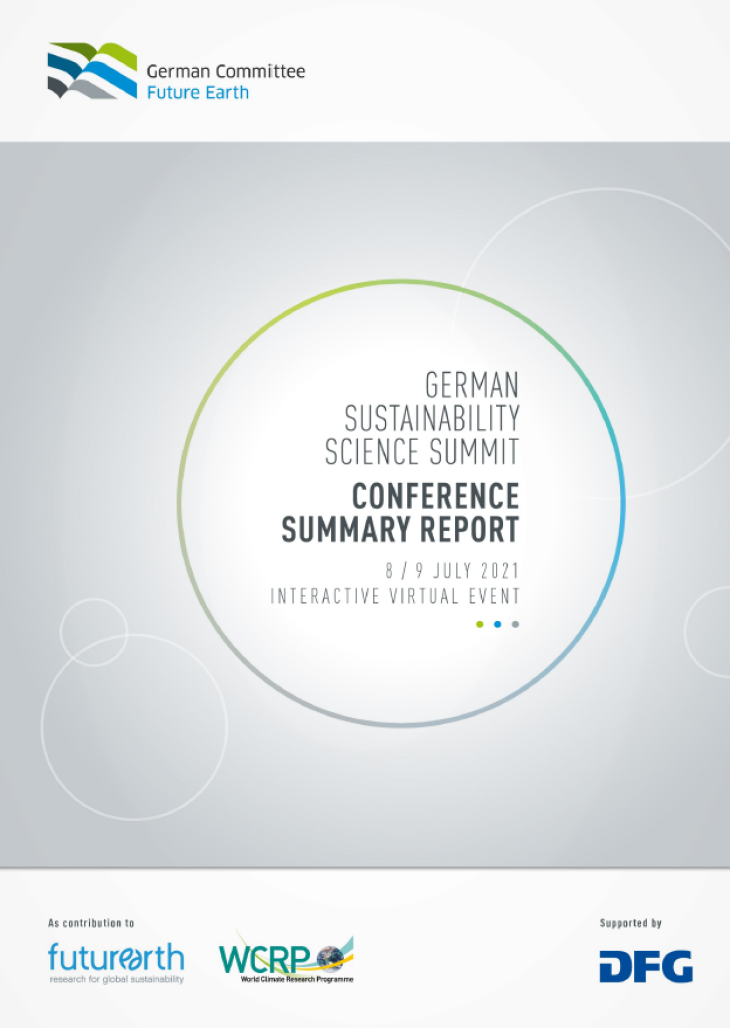
On 8 and 9 July 2021, the German Sustainability Science Summit 2021 took place as an interactive online event. In the Conference Summit Report we have documented all sessions and we cordially thank all contributors. Contributions to the research priorities described in the DKN position paper will also be published as comments together with the position paper shortly.
The Summit provided a platform for exchange on new scientific findings and research needs in the field of sustainability research. Around 500 participants from 49 countries from all over the world had registered for the online event and participated spread over two days. About 150 participants acted as hosts and speakers of the 30 different summit sessions.
German Committee Future Earth (2021),
German Sustainability Science Summit 2021, Conference Summary Report, Hamburg, Germany.
ISBN: 978-3-9813068-9-7
Download Report (2,1 MB)
3. German Future Earth Summit (2018) Conference Summary Report
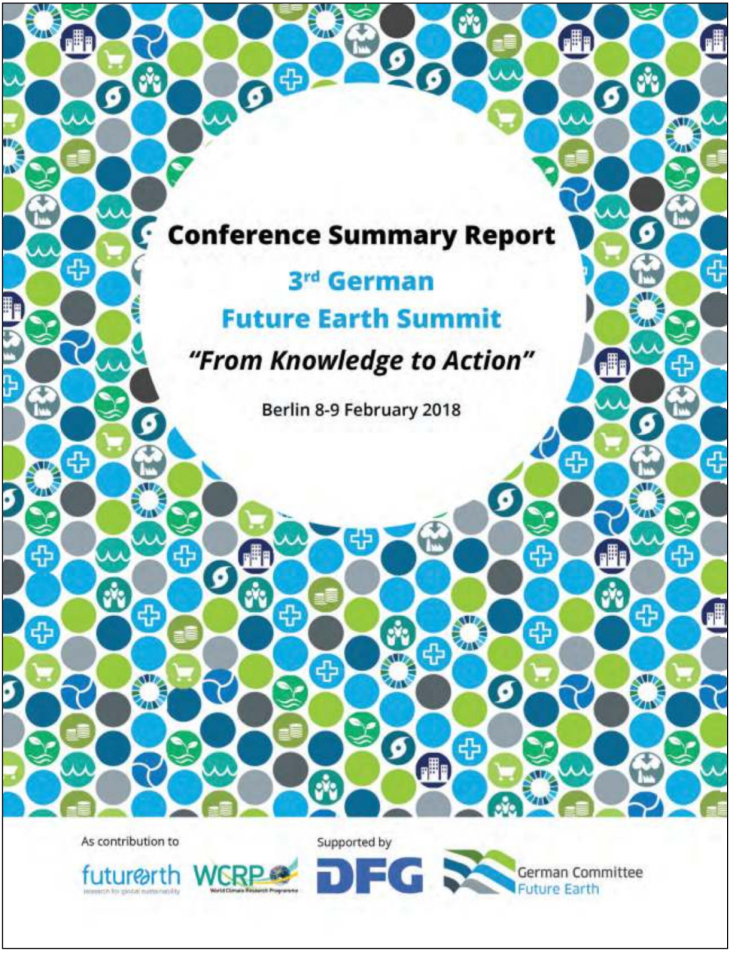
At the 3rd German Future Earth Summit (8-9 February 2018) scientists from various disciplines and institutions as well as political and societal actors gathered in Berlin to address and discuss a variety of issues in global sustainability research. The key topics of this summit included: Acquiring a better understanding of designing and implementing long-term pathways towards sustainable development in cities, on land and in the ocean, organising, collaborating and sharing knowledge and activities in order to provide solution-oriented insights (regarding the urgent need to achieve the SDGs by 2030), as well as working across academic disciplines and collaborating with relevant societal leaders to uncover the huge potential for new, promising, societally relevant pathways to global sustainability.
Schmalzbauer, B., Visbeck, M. (Eds.), 2018
DKN Future Earth Stuttgart/Kiel
ISBN 978-3-9813068-7-3
Download report (5,8 MB)
The contribution of science in implementing the Sustainable Development Goals
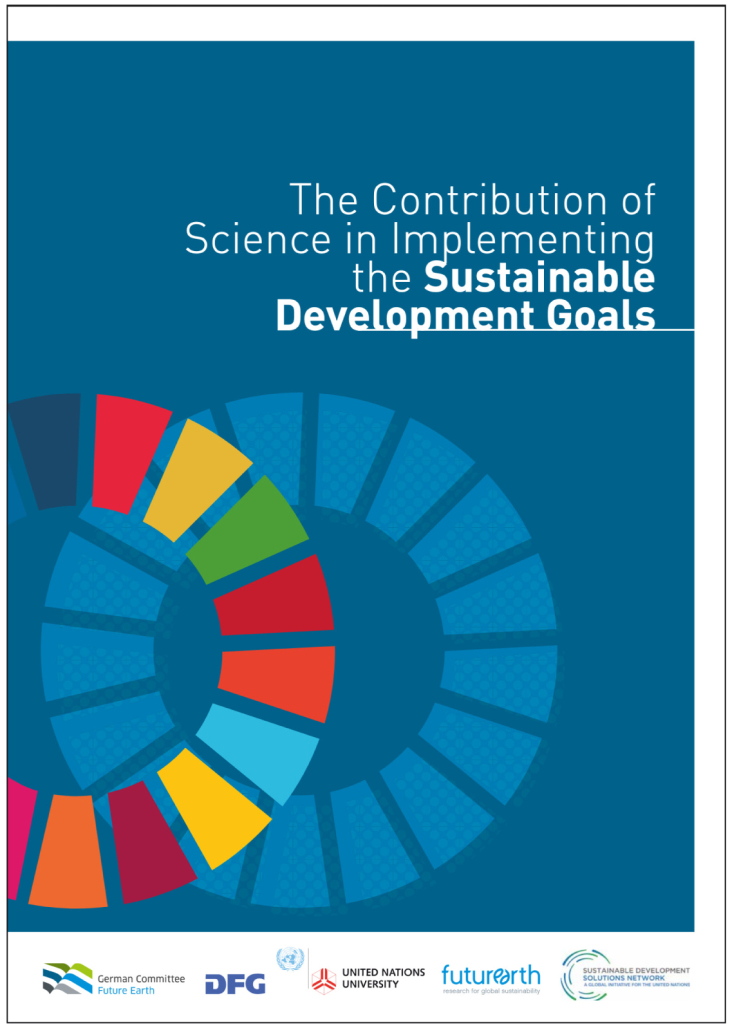
Major issues in the successful implementation of the 2030 Agenda for Sustainable Development and its 17 Sustainable Development Goals (SDGs) are likely to be: consistency with other political processes (e.g. UNFCCC), implementability (e.g. interactions between goals) and measurability (e.g. indicators). Science can contribute to all these aspects by providing the fundamental knowledge base necessary for decision-making and practical implementation of the SDGs. Rapid advances in science can best be achieved with an integrated, cross-sectoral and engaging scientific agenda that connects upstream fundamental research with solution-oriented research. Therefore the DFG has joined forces with a number of international partners to further strengthen the role of science in the 2030 Agenda.
This report bringing together the results of two conferences on the advancement of the 2030 Agenda for Sustainable Development. The conferences were organised in cooperation with partners from science, government, the UN and civil society. The first conference focused on “Measuring Sustainable Development” and was run by the DFG and UNU in 2015; the second was a “Foresight workshop on science needs in implementing the SDG framework” and was organised by the German Committee Future Earth, Future Earth and SDSN in 2016.
Schmalzbauer, B., Visbeck, M. (Eds.)
December 2016
German Committee Future Earth, Stuttgart/Kiel
ISBN 978-3-9813068-5-9
Download report (2,9 MB)
2. German Future Earth Summit (2016) Conference Summary Report
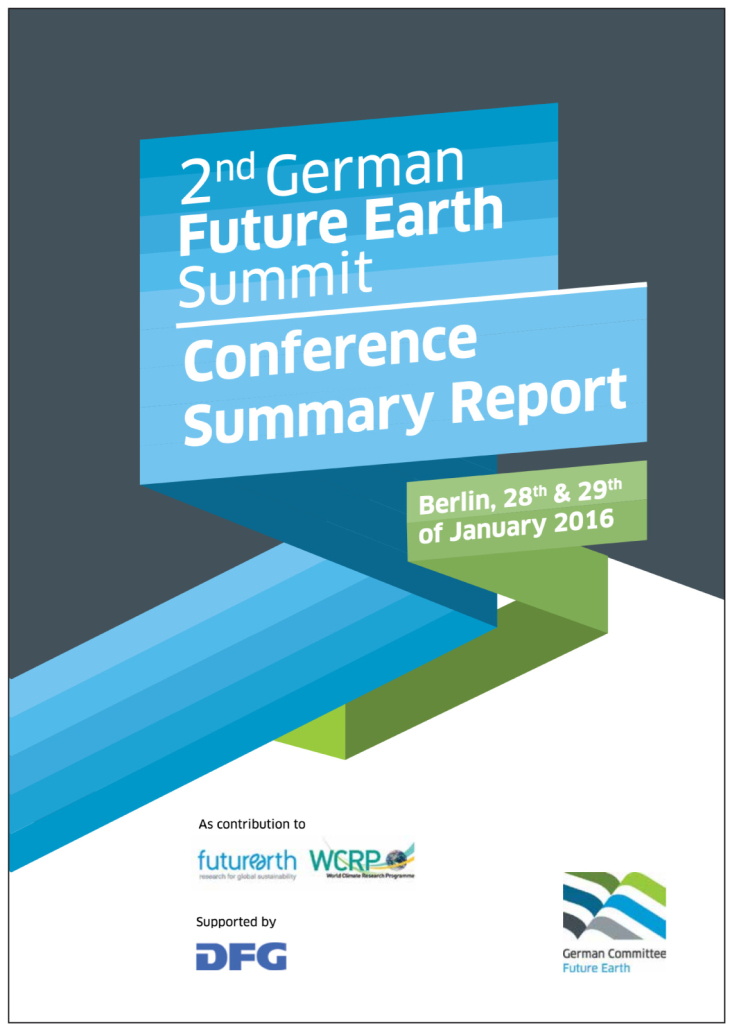
At the 2nd German Future Earth Summit (28 to 29 January 2016) scientists from various disciplines and institutions as well as political and societal actors came together in Berlin to exchange views about pressing issues in global sustainability research. Main topics discussed at this 2nd Summit were cross-cutting capabilities in Future Earth: Observing, monitoring and data systems, Earth system modeling and social macrodynamics, Metrics and evaluation for human wellbeing and sustainable development, Theory and method development and Science-society interface.
The conference summary report includes all outcomes of the different sessions as well as the results of numerous other events organised by the German academic community to further develop research in the context of Future Earth and WCRP.
Schmalzbauer, B., Visbeck, M. (Eds.), 2016
DKN Future Earth Stuttgart/Kiel
ISBN 978-3-9813068-4-2
Download report (2,3 MB)
1. German Future Earth Summit (2014) Conference Summary Report
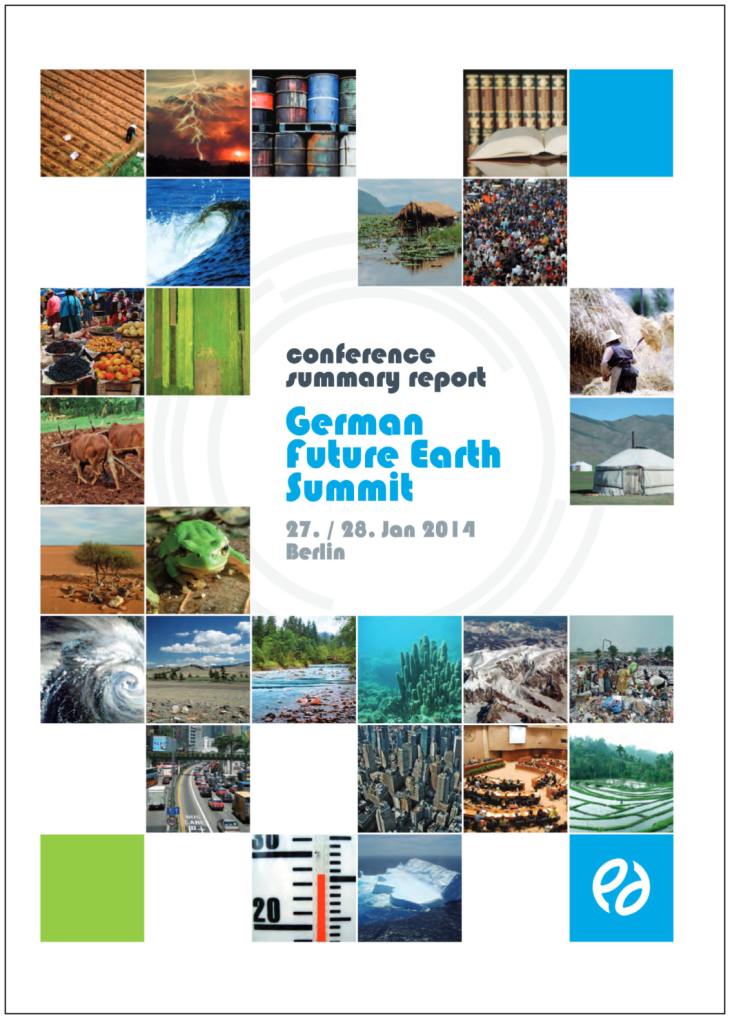
To further develop Future Earth in Germany, the German Committee Future Earth (DKN Future Earth) held the first German Future Earth Summit in January 2014. The two- day programme included presentations, panel discussions and workshops. The overall aim was to initiate a dialogue on possible Future Earth research priorities from a German perspective. The summit also set out to foster interdisciplinary collaboration across the natural and social sciences, humanities, economics and engineering, as well as involve policy-makers, funding agencies, industry and other sectors of German civil society. It also provided opportunities to discuss possibilities for collaboration in cross-cutting Future Earth topics such as research methods and concepts, stakeholder involvement, environmental and societal data availability, potential contributions to the UN International Year for Global Understanding and the role of early career scientists.
The German Future Earth Summit was intended to be one of the steps towards the development of a national perspective and roadmap for Future Earth research.
The overwhelmingly positive response of the scientific community gives us confidence that Germany is and will remain a strong supporter of research on global sustainability.
The conference summary report was prepared by the DKN Future Earth Secretariat and is based on discussions between conference participants and contributions from the workshop organisers.
Schmalzbauer, B., Visbeck, M. (Eds.), 2014
DKN Future Earth Stuttgart/Kiel
ISBN 978-3-9813068-3-5
Download report (2,2 MB)
DKN position paper: Research priorities for sustainability science
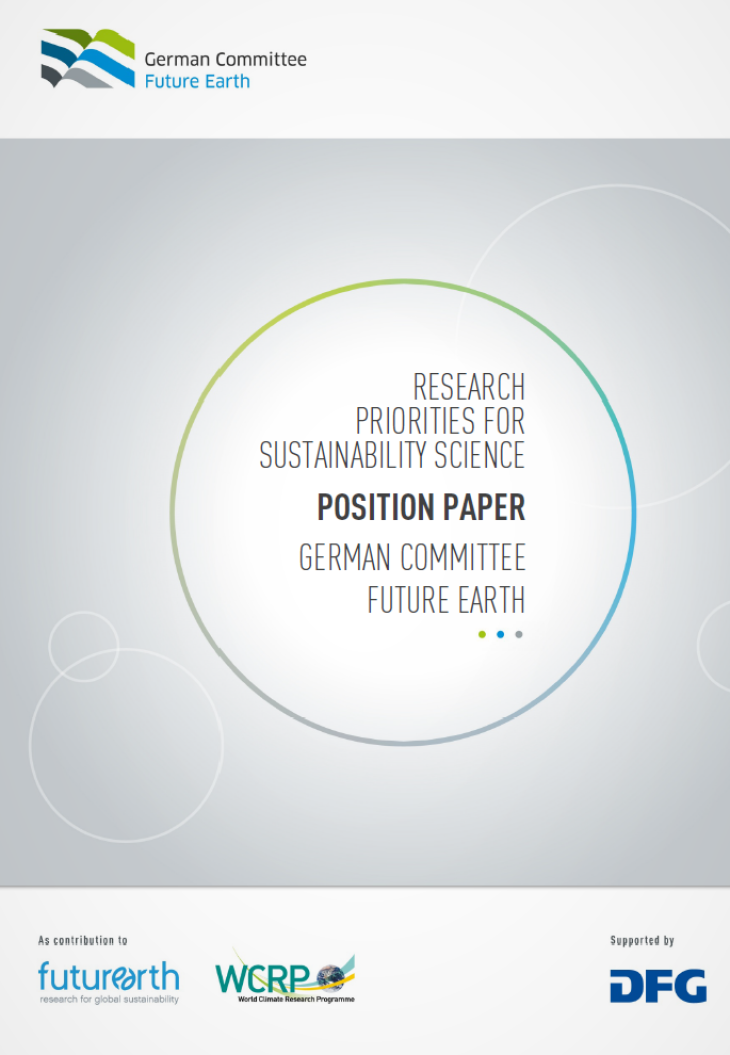
With this position paper the DKN highlights pertinent research gaps and suggests forthcoming fields of research. It combines insights from global environmental change research and the environmental social sciences and humanities. This programmatic framework will form the basis of the future work program of the committee itself. Furthermore, it is hoped that it will motivate other scientists to engage across disciplinary boundaries with the manifold epistemological, theoretical, and methodological challenges of sustainability science.
This contribution addresses agents in science, science management, and science funding in a national and an international context. The paper has been developed over the past two years. It reflects discussions within the German Committee Future Earth in times of the COVID-19 pandemic and debates on the contents of the paper during the course of the German Sustainability Science Summit 2021.
Further information about the position paper can be found here.
For the direct download of the position paper please click here.
Deutsches Komitee für Nachhaltigkeitsforschung
in Future Earth (DKN) / German Committee Future Earth
Recommended citation
Jacob, D., Birkmann, J., Bollig, M., Bonn, A., Nöthlings, U.,
Ott, K., Quaas, M., Reichstein, M., Scholz, I., Malburg-Graf, B.,
Sonntag, S. (2022): Research priorities for sustainability
science. German Committee Future Earth,
Hamburg, Germany.
ISBN: 978-3-9813068-8-0
DKN Working Paper: Sustainable work – The social-ecological transformation of the working society

This final report of the working group “Sustainable Work” in the German Committee Future Earth focusses on the presentation of key points, central topics and questions that are part of a research agenda on sustainable work and the related socio-ecological transformation of current working societies. With this, the working group joins international and national discourses on the Sustainable Development Goals and their implications in relation to work.
Jochum, G.; Barth, T.; Brandl, S.; Cardenas Tomazic, A.; Hofmeister, S.; Littig, B.; Matuschek, I.; Stephan, U. & Warsewa G. (2019): Sustainable work – The social-ecological transformation of the working society. Position paper of the Working Group “Sustainable work” of the German Committee Future Earth. Hamburg.
Download (1,6 MB)
Transdisciplinary sustainability research and citizen science: Options for mutual learning
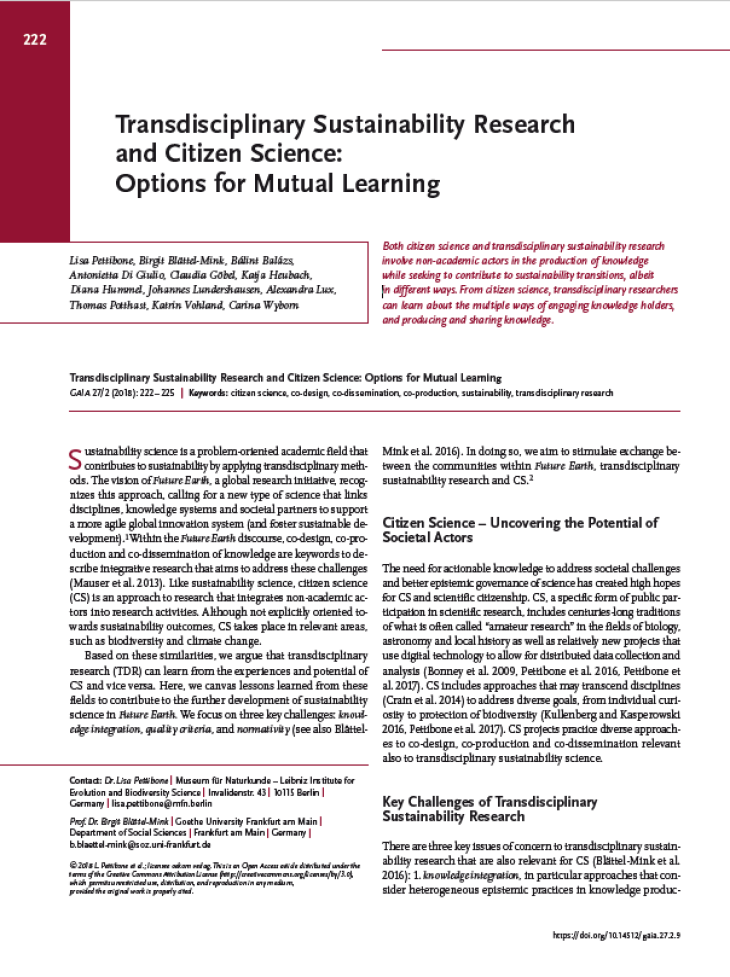
Transdisciplinary research can learn from the experiences and potential of citizen science and vice versa. In this article the authors canvas lessons learned from these fields to contribute to the further development of sustainability science in Future Earth. They focus on three key challenges: knowledge integration, quality criteria, and normativity. In doing so, the authors aim to stimulate exchange between the communities within Future Earth, transdisciplinary sustainability research and citizen science.
The article is published Open Access in the peer-reviewed inter- and transdisciplinary journal GAIA.
Pettibone, L. et al. (2018). Transdisciplinary Sustainability Research and Citizen Science: Options for Mutual Learning. GAIA 27/2 (2018): 222 – 225.
Download (546 KB)
How the sustainable intensification of agriculture can contribute to the SDGs
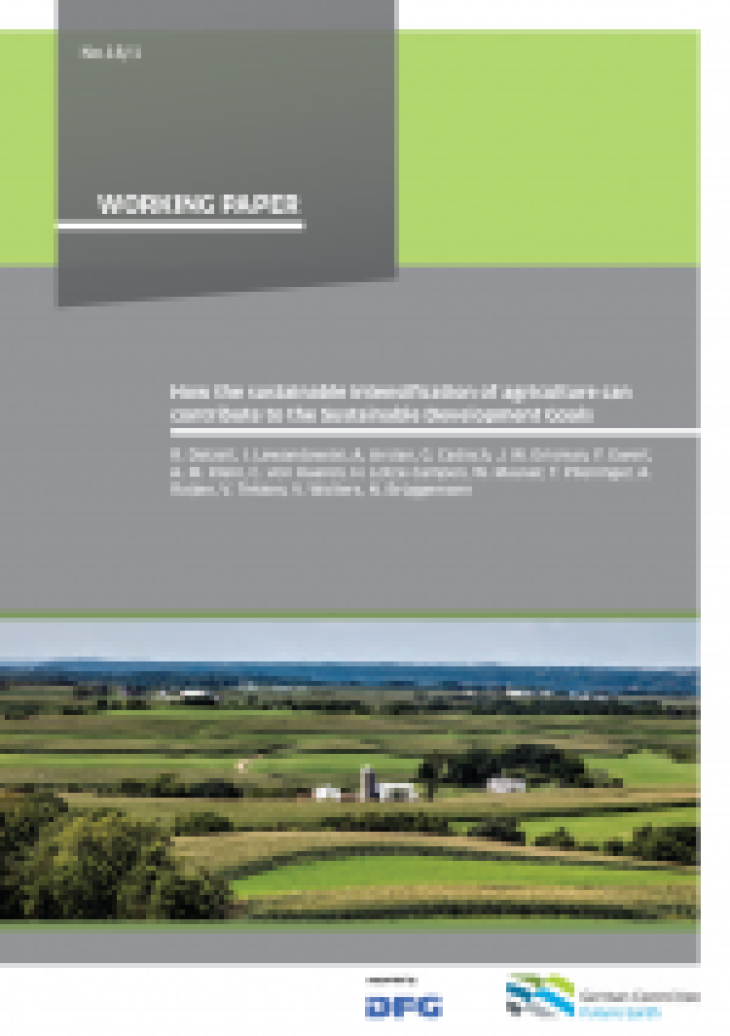
The increase in global population and rapid change in human diets are putting enormous pressure on agricultural production, which already has a limited expansion capacity. By outlining possibilities for the sustainable intensification of agriculture, the research community can make a valuable contribution to alleviating some of these environmental effects and their social ramifications.
To tackle sustainable intensification research and implementation challenges, the currently prevailing socio-economic and natural science perspective needs to be broadened to include the social sciences and humanities. The new approach, suggested by the working group in their new working paper, should be based on:
1. globally available, spatio-temporally highly resolved and standardized measurements of basic environmental parameters (including soil quality, all agricultural activities and their environmental consequences), using both satellite and ground-based observation networks;
2. local, regional and global socio-economic indicators (such as factor productivity, rural development, food security, cultural aspects, livelihood development, diet and consumption patterns); and
3. a set of integral key performance indicators that both characterize the system and can be used to directly steer improvements. A multi-disciplinary knowledge network could convert this stream of data into region-specific management options to be implemented by individual farmers and extensions services. At the same time, specific socio-ecological indicators need to be developed, which allow verification of the success of SI at the local, regional and global level and its contribution to achieving the Sustainable Development Goals (SDGs).
This approach differs from classical verification in that it combines implementation support with verification at all spatial levels.
The establishment of this global, but at the same time site- and region-specific, implementation and verification system for Sustainable Intensification poses a massive transdisciplinary research challenge. It will require research agendas that includes a multidisciplinary, multi-scale research approach to sustainable intensification that is embedded in a well-structured process of continuous stakeholder engagement at all relevant levels of decision-making.
Delzeit, R. et al. (2018). How the sustainable intensification of agriculture can contribute to the Sustainable Development Goals. Working Paper No. 18/1. German Committee Future Earth. Stuttgart/Kiel.).
Download (502 KB)
Sustainable labour: Promoting social-ecological transformation of the labour economy
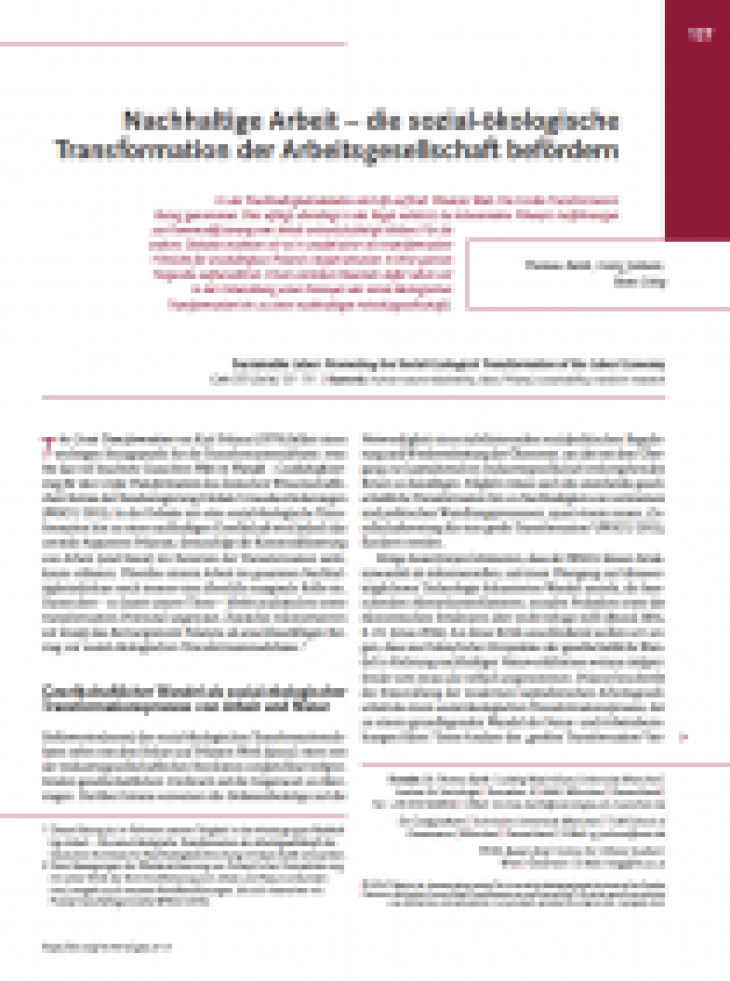
In der Nachhaltigkeitsdebatte wird oft auf Karl Polanyis Werk Die Große Transformation Bezug genommen. Dies erfolgt allerdings in der Regel verkürzt, da insbesondere Polanyis Ausführungen zur Kommodifizierung von Arbeit unberücksichtigt bleiben. Für die weitere Debatte erachten wir es in analytischer wie transformativer Hinsicht für unabdingbar, Polanyis Argumentation in ihrer ganzen Tragweite aufzunehmen. Einen zentralen Baustein dafür sehen wir in der Entwicklung eines Konzepts der sozial-ökologischen Transformation hin zu einer nachhaltigen Arbeit(sgesellschaft).
The article is published in the peer-reviewed inter- and transdisciplinary journal GAIA.
Barth T., Jochum G., Littig B. (2018) Sustainable labour: Promoting social-ecological transformation of the labour economy. GAIA - Ecological Perspectives for Science and Society, Volume 27, Number 1, 2018, pp. 127-131(5). (in German)
zum Artikel
Investigating the potential role of national committees in Future Earth
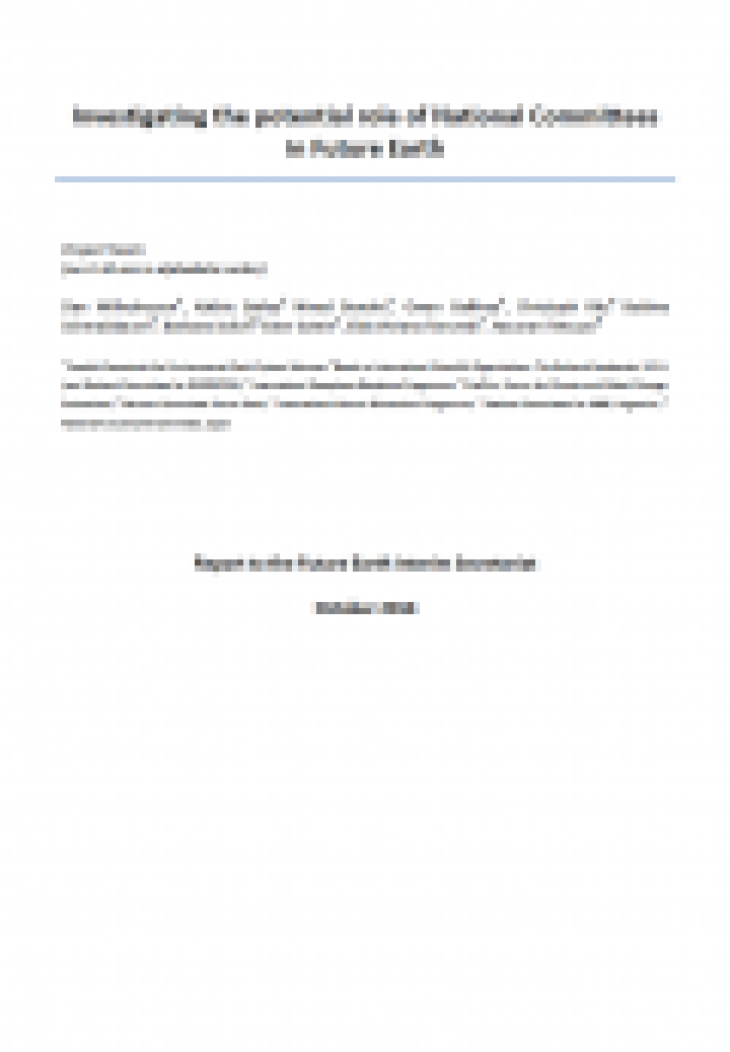
The aim of the science plan on global change of biodiversity is the further development of a national research strategy to call out high-priority goals and the required focus to reach those goals. It was submitted by DIVERSITAS Germany and then discussed and developed together with the national committee for Global Change. Further statements on useful and reasonable interdisciplinary cooperation and the needed grade of integration as well as political and economical implications shall be made.
In November 2013, The Future Earth Interim Secretariat invited the Swedish Secretariat for Environmental Earth System Sciences (SSEESS, also representing the Swedish National Committee for Global Environmental Change) to lead a consultative process on the nature and structure of national-level coordination for Future Earth with some of the key players among National Committees (NC) globally. The request was accepted by SSEESS and the Swedish NC represented by SSEESS. SSEESS teamed up with NCs in Argentina, Germany, Japan, Switzerland, and USA (some other NCs were also approached without success). Four of these six NCs represented in the project team were already organized as Future Earth Committees. Subsequently, SSEESS also invited representatives from IHDP and IGBP to join the project team, to share experiences and ideas from a programme perspective.
One specific objective of the consultative process was to examine how NCs can support the implementation and reinforce the aim and vision of Future Earth on a national level. Options for establishing a global network of NCs for Global Change Research/Future Earth were also explored. The underlying assumption for this consultative process was that Future Earth will broadly integrate NCs in its national level activities and strategies. Other options for national coordination may be considered, but this was only briefly treated in this work.
Download (972 KB)
Gesucht: Wissensbasierte Antworten
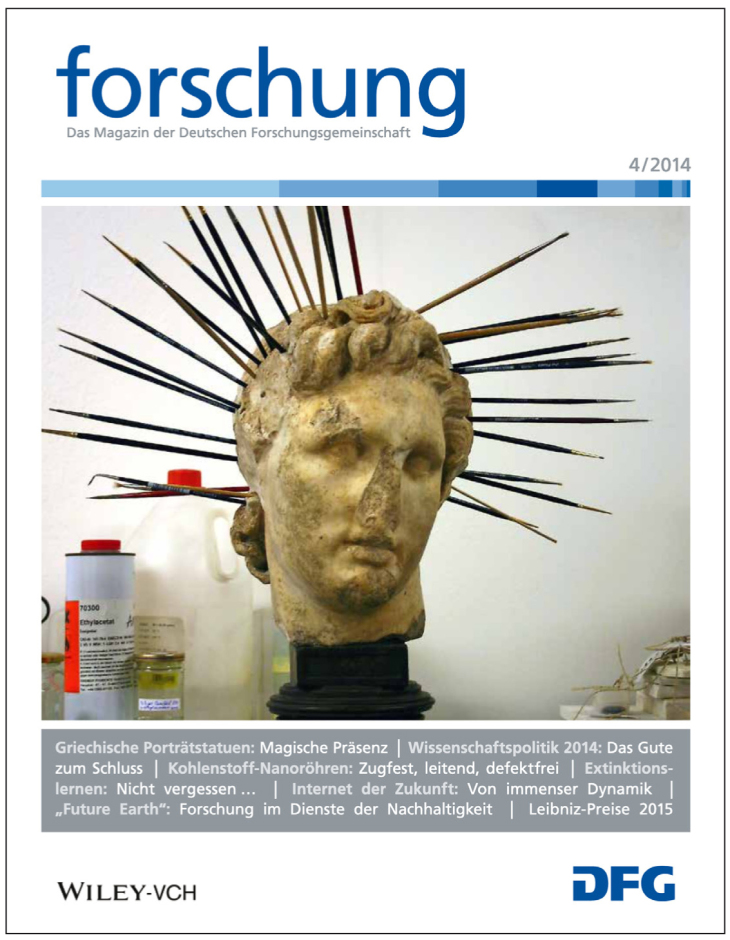
Mit dem globalen Wachstum von Bevölkerung und Wohlstand geht ein Wandel einher, der verschiedenste weltweite Probleme mit sich bringt, von Klimaveränderungen über Ressourcenknappheit und Ernährungsfragen bis hin zum Verlust der Biodiversität. Das Forschungsprogramm „Future Earth” will durch internationale Zusammenarbeit, interdisziplinäre Forschungskooperationen und vernetzte Grundlagenforschung globales und regionales Wissen schaffen, um diesen Fragen begegnen zu können. Es soll die internationale Kooperation erleichtern und verschiedene Wissenschaftsdisziplinen vereinen, aber auch als Schnittstelle zu Gesellschaft, Wirtschaft und Politik dienen.
Visbeck, M., Schmalzbauer, B., 2014
DKN Future Earth Stuttgart/Kiel
In: DFG-Magazin "forschung"
Download Artikel (150 KB)
Transdisciplinary global change research: the co-creation of knowledge for sustainability
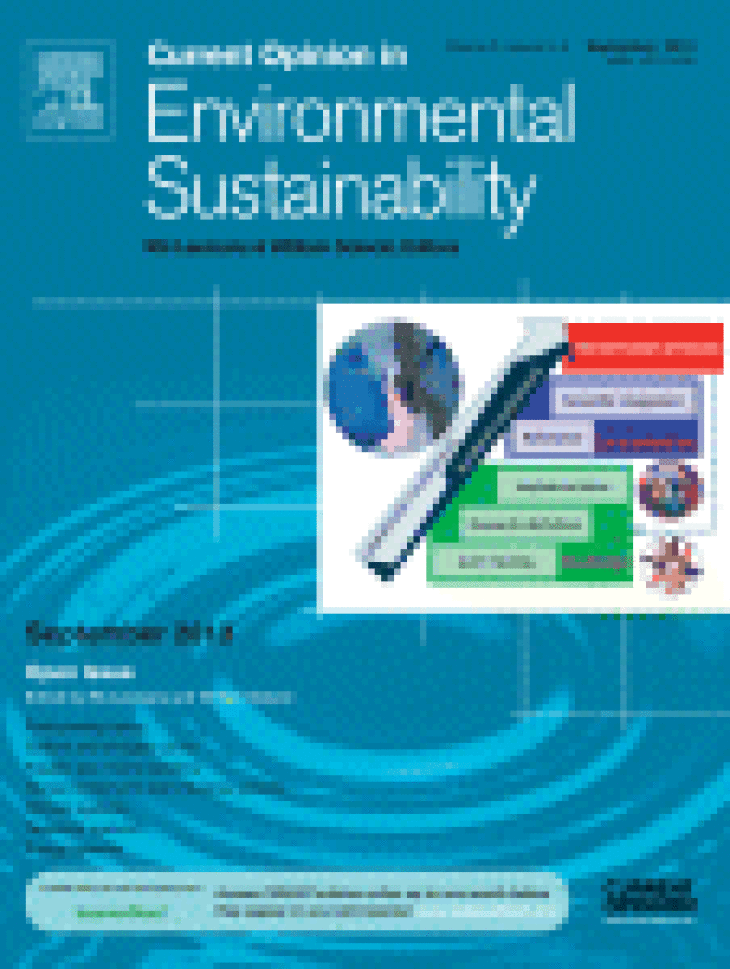
This paper analyses the relationship between scientific integration and transdisciplinarity, discusses
the dimensions of integration of different knowledge and proposes a platform and a paradigm for research towards global sustainability that will be both designed and conducted in partnership between science and society. We argue that integration is an iterative process that involves reflection among all stakeholders. It consists of three stages: co-design, coproduction and co-dissemination.
The paper is part of the outcomes of the workshop on "Co-designing knowledge across scientific fields, national borders and user groups" organised by NKGCF, ESSP, ISSC and ICSU.
Download paper (755 KB)
Key Messages of the workshop Co-Designing knowledge
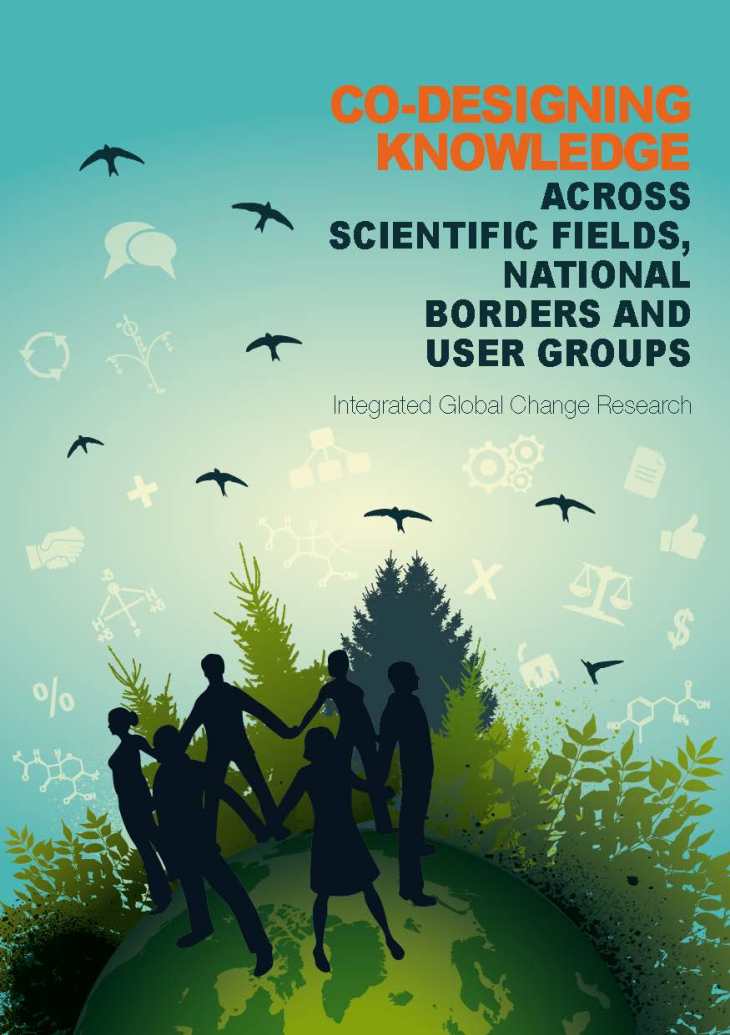
In Vorbereitung auf die zukünftigen Herausforderungen für die Global Change Community, veranstaltete das Nationale Komitee für Global Change Forschung (NKGCF) in Zusammenarbeit mit der Earth System Science Partnership (ESSP), das International Council for Science (ICSU) und das International Social Science Council einen Workshop in Berlin (7.-8. März 2012) mit finanzieller Unterstützung der Deutschen Forschungsgemeinschaft (DFG).
Mit dem Ziel das Co-Design und die Co-Produktion von Wissen erfolgreich im Rahmen von Future Earth voranzubringen, wurden auf dem Workshop aktuelle Beispiele der integrativen Forschung diskutiert, die Dimensionen von Integration erörtert und mögliche Schlüsselkomponenten versucht zu identifizieren.
Die Ergebnisse und Kernaussagen des Workshops sind in folgender Broschürezusammengefasst.
Download (1,0 MB)
Global Change Research in Germany 2011
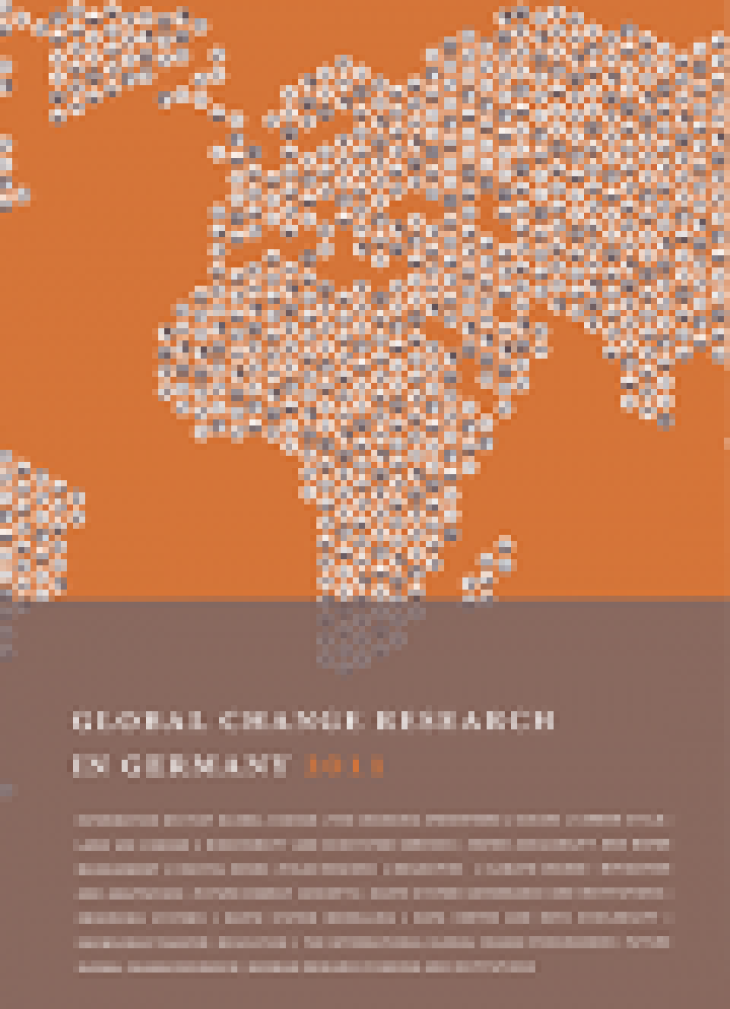
Von der Rekonstruktion des Klimas über Landmanagement, Polarforschung, Erforschung der Ozeane und urbanen Räume, Energiekonzepte, Governancestrukturen, Erdbeobachtung, Erdsystemmodellierung bis hin zur Verfügbarkeit von Datensätzen, Capacity Building und Ausbildung der nächsten Generation von Wissenschaftlern greift die Broschüre vielfältige Themenbereiche auf, die sich im Rahmen der Forschung zum globalen Wandel ergeben. Forschung zum globalen Wandel ist Forschung für die globale Nachhaltigkeit. Damit stellt sich dieser Forschungsbereich insbesondere gesellschaftsrelevanter Problem- und Fragestellungen, die meist eine fächerübergreifende Herangehensweise erfordern. Die Broschüre zeigt anhand diverser Beispiele die Vielfältigkeit der deutschen Beiträge auf, deren internationale Einbindung sowie die Möglichkeit und in vielen Bereichen die Notwendigkeit der global koordinierten Herangehensweise mit Hilfe der Global Change Programme und ESSP.
Download Poster (2,4 MB)
Regionale Klimamodelle: Potenziale, Grenzen und Perspektiven
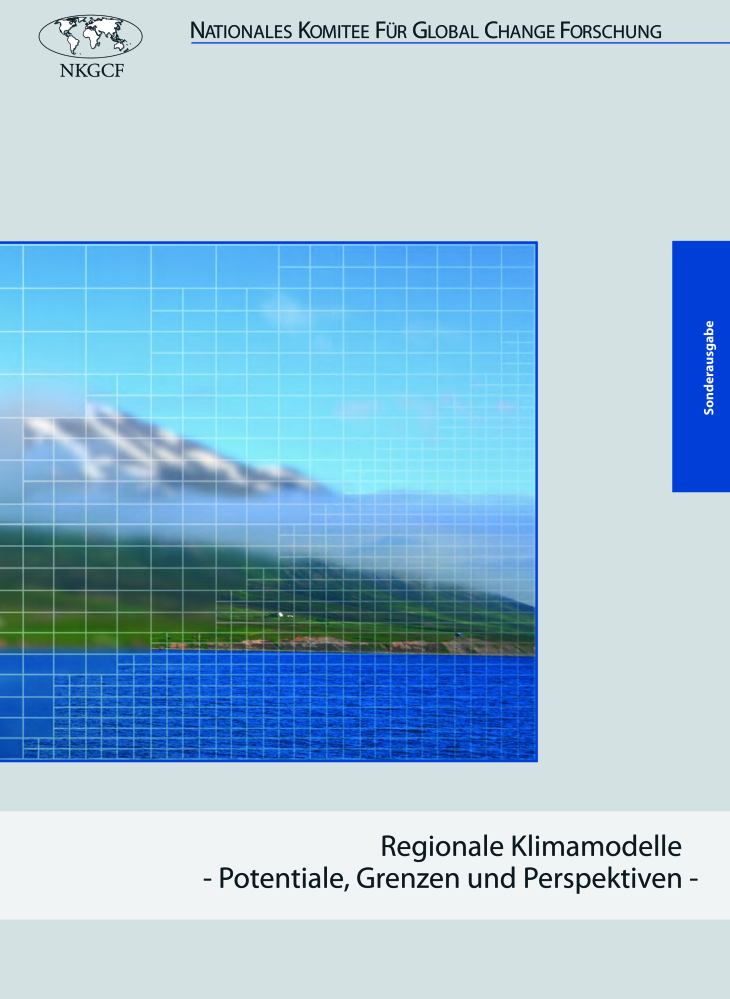
Regionale Klimaprojektionen müssen vielen unterschiedlichen Be¬dürfnissen aus den Bereichen der Politik, Wirtschaft und Gesellschaft gerecht werden. Die Ansprüche sind hoch und divers, weshalb mit den aktuellen Klimaprojektionen viele Fragestellungen (noch) nicht beantwortet werden können. Der Inhalt der Broschüre beruht auf den Präsentationen und Diskussionen der Rundgesprächsteilnehmer und gibt einen Einblick in die Thematik sowie Problematik.
P.-T. Stoll, W. Mauser, M. Schulz. B. Höll (Hrsg.), 2010 NKGCF Kiel ISBN 978-3-9813068-1-1 (2,6 MB)
Tough Choices: Land Use under a Changing Climate
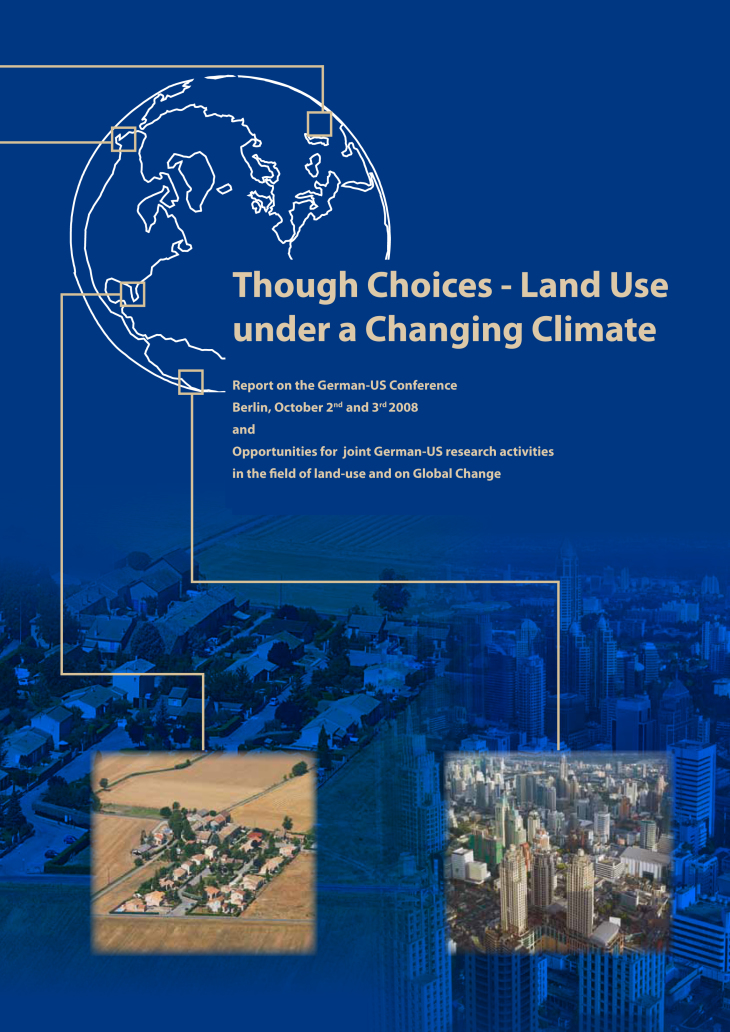
On the 2nd and 3rd of October 2008, the German Research Foundation, in cooperation with the German Federal Ministry of Education and Research and the American National Science Foundation, convened the German-US conference Tough Choices – Land Use under a Changing Climate in Berlin, Germany. The focus of this meeting, in which over 80 German and American scientists were invited to participate, was land use and conflicts resulting from the limitations of global land resources and climate change. This report addresses researchers from both countries who work in the field of global change research and have a particular interest in the interactions between land use and climate change as well as research funding organisations in both countries.
Daniel G. Brown, Bettina S. Höll, Wolfram Mauser, Derek T. Robinson (Hrsg.), 2009 NKGCF München ISBN 978-3-9813068-0-4 (2,1 MB)
Global Change Research in Germany 2008
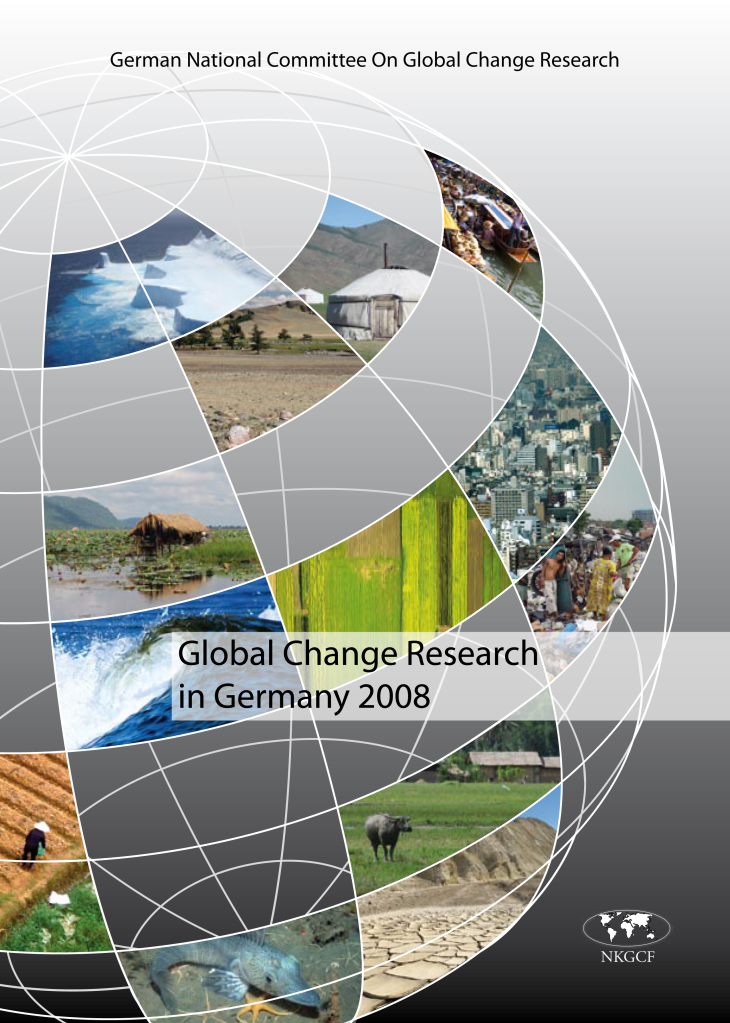
Die Publikationsserie des NKGCF „Global Change Research in Germany 2008“ gibt anhand von Hintergrundtexten und angewandten Forschungsbeispielen einen Überblick über die aktuellen Forschungsaktivitäten in Deutschland und zeigt zukünftige Forschungsanstrengungen und Handlungsstrategien im Bereich Global Change auf. In der Broschüre wird der Beitrag des Bundesministeriums für Bildung und Forschung, der Deutschen Forschungsgemeinschaft und institutioneller Forschung dargestellt sowie stellt sie den Bezug zu den vier internationalen Global Change Programmen und der Earth System Science Partnership dar.
B. Höll, W. Mauser (Hrsg.), 2008 NKGCF München ISBN 978-3-9808099-5-5 (2,3 MB)
Earth System Science in the Anthropocene
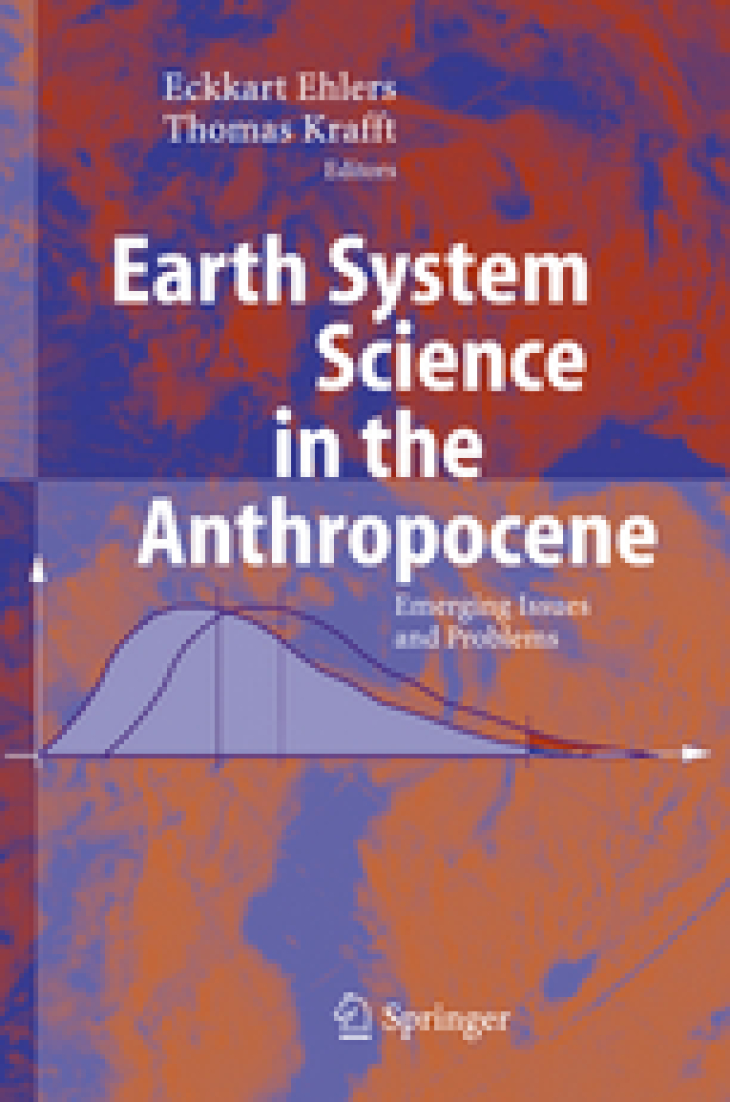
Als Teil der Publikationsserie des Nationalen Komitees erlaubt „Earth System Science in the Anthropocene“ einen umfassenden und aktualisierten Einblick in spezielle Themen im Bereich der Global Change Forschung, besonders bezogen auf die menschliche Sicherheit. Zusätzlich gibt es einen Überblick über die neuen Joint Projects der Earth System Science Partnership , die von den vier internationalen Global Change Programmen etabliert wurde sowie über wichtige deutsche Forschungsbemühungen. Empfehlungen für aufkommenden Forschungsbedarf im Global Change Bereich und Vorschläge für die zukünftige Entwicklung der Global Change Forschung, z.B. zur Entwicklung neuer Forschungsgebiete oder zur besseren Integration der Sozialwissenschaften werden ebenfalls gegeben.
Das Buch kann über den Buchhandel bezogen werden.
E. Ehlers, T. Krafft (Hg.), 2006 Springer-Verlag Heidelberg ISBN 3-540-26588-0
Global Change Research in Germany 2005
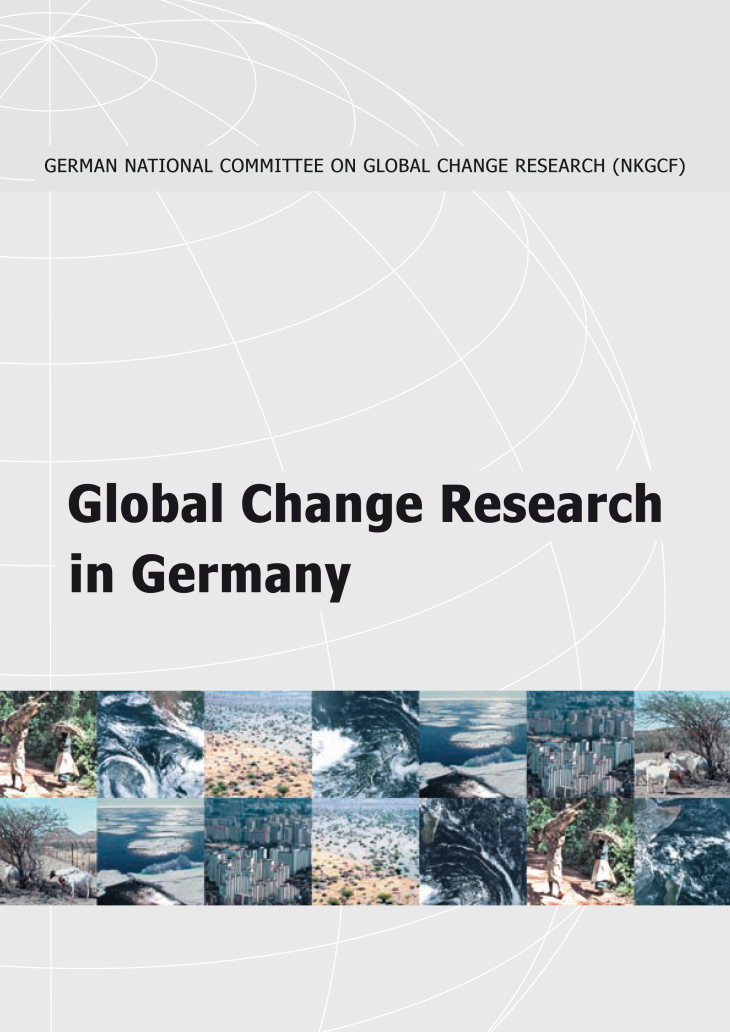
Global Change Forschung untersucht insbesondere die Entwicklung und Auswirkung von Wechselwirkung und Veränderungsprozessen zwischen menschlicher Gesellschaft und den übrigen Komponenten des Erdsystems und leitet daraus mögliche Handlungsstrategien ab."Global Change Reserach in Germany" gibt anhand von Hintergrundtexten und angewandten Forschungsbeispielen einen Überblick über aktuelle Forschungsaktivitäten sowie zukünftige mögliche Forschungsschwerpunkte in Deutschland, erläutert den speziellen Beitrag von Bundesregierung und institutioneller Forschung und stellt den Bezug zu internationalen Programmen und ESSP dar.
T. Krafft, W. Mauser (Hg.), 2005 NKGCF München ISBN 3-9808099-4-3 (6,1 MB)
Health and the Environment: A crosscutting issue
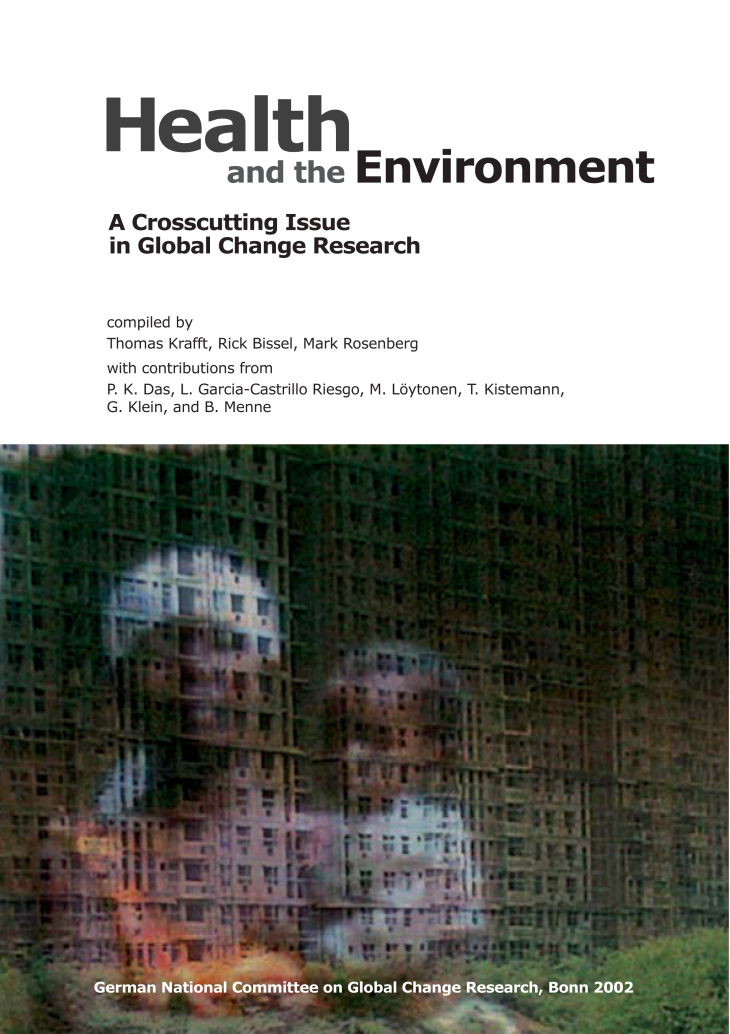
Einer Anfrage des Internationalen Rats der Wissenschaften ( ICSU ) und des International Human Dimension Programme on Global Environmental Change ( IHDP ) folgend hat das wissenschaftliche Sekretariat des Nationalen Komitees für Global Change Forschung einen internationalen Workshop zum Thema „Gesundheit und Umwelt“ organisiert, der im Februar 2001 in Bad Honnef in der Nähe von Bonn stattfand. Hauptziel des Workshops war die Identifizierung von Forschungsschwerpunkten im Bereich Gesundheit und Umwelt im Kontext des globalen Umweltwandels. Dieser Report fasst die Empfehlungen dieses Workshops zusammen.
T. Krafft, R. Bissel, M. Rosenberg (Hg.), 2002 NKGCF Bonn ISBN 3-9808099-2-7 (391 KB)
Disaster Reduction and Global Environmental Change
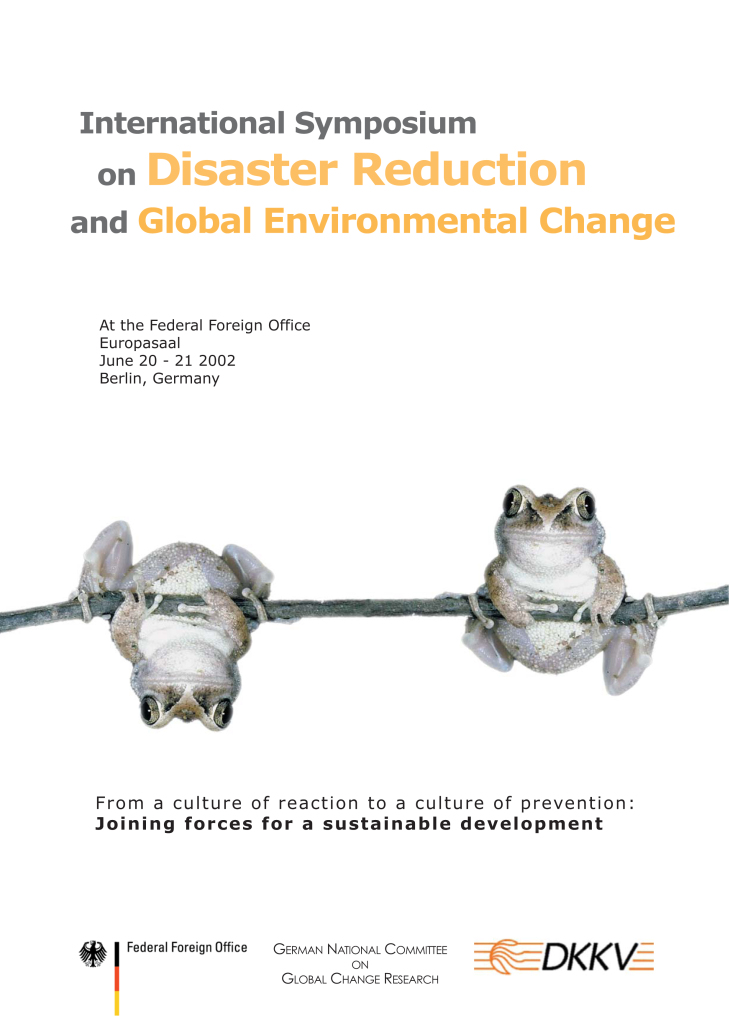
Dieser Report basiert auf dem “International Symposium on Disaster Reduction and Global Environmental Change”, das im Juni 2002 in Berlin stattfand. Es wurde gemeinsam vom Deutschen Komitee für Katastrophenvorsorge und vom Nationalen Komitee für Global Change Forschung organisiert. Das Symposium hat Experten aus der Global Change Forschung und der Katastrophenvorsorge aus 17 Ländern zusammengebracht, um die Trends im globalen Wandel und ihre Auswirkungen auf Aktivitäten der Katastrophenvorsorge zu diskutieren.
NKGCF, 2002 NKGCF Bonn ISBN 3-9808099-3-5 (949 KB)
Biodiversität: Globaler Wandel einer lebenswichtigen Ressource
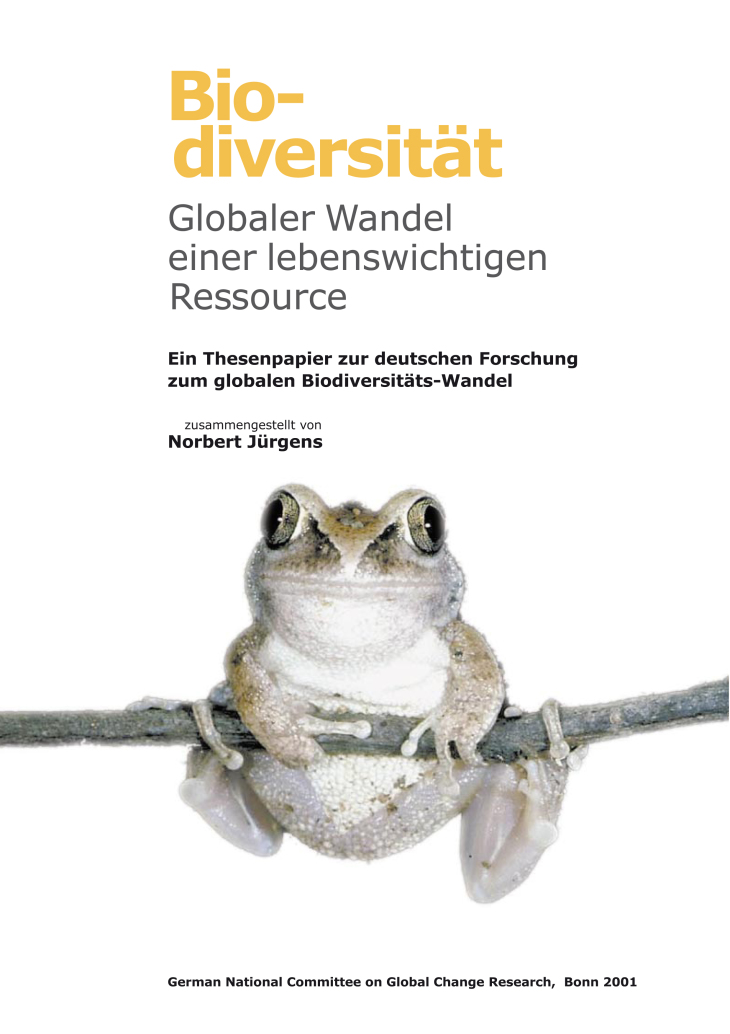
Ziel dieses von DIVERSITAS Deutschland vorgelegten und vom Nationalen Komitee für Global Change Forschung ausführlich diskutierten und gemeinsam weiterentwickelten Konzeptpapiers ist die Weiterentwicklung einer nationalen Forschungsstrategie, die prioritäre Zielsetzungen benennt und die zu ihrer Erreichung notwendigen Schwerpunktbildungen aufzeigt. Weiterhin sollen Aussagen zu den notwendigen und sinnvollen interdisziplinären Kooperationen, dem Integrationsgrad sowie den politischen und ökonomischen Implikationen gemacht werden.
Jürgens, N., 2001 NKGCF Bonn ISBN 3-9808099-1-9 (2,2 MB)
Global Change Research in Germany 2001
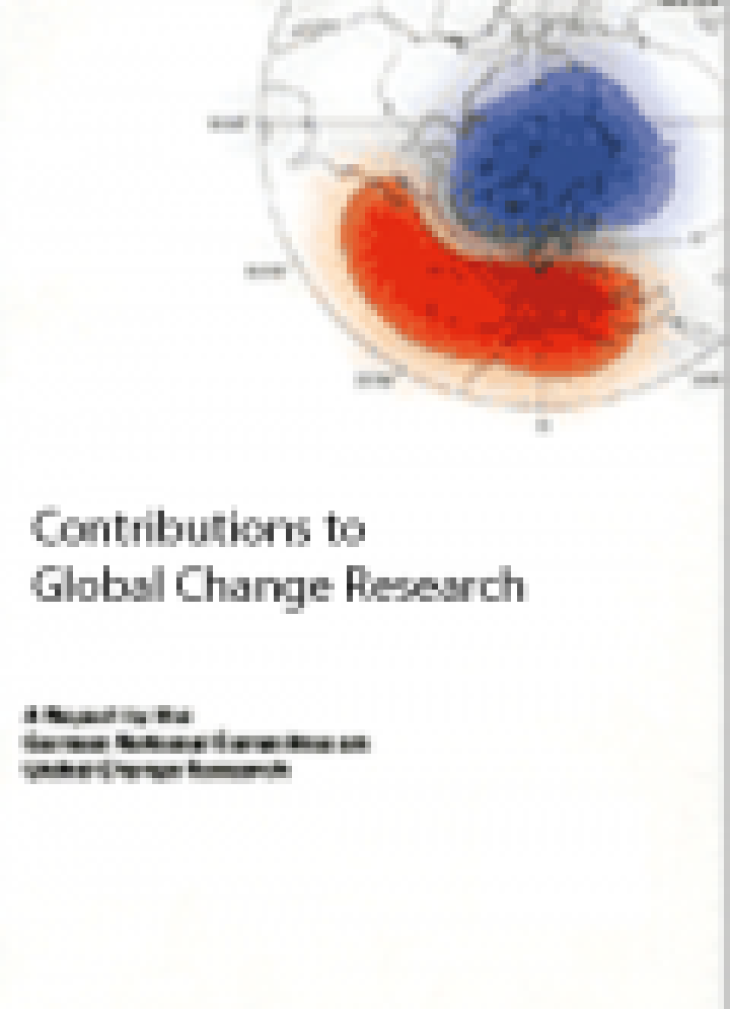
Im Januar 2001 hat das Nationale Komitee für Global Change Forschung das 2. gemeinsame nationale Kolloquium zur Global Change Forschung organisiert, auf dem Forschungsgemeinschaften der vier Programme WCRP , IGBP , IHDP und DIVERSITAS zusammenkamen. 150 deutsche Wissenschaftler/innen aus dem gesamten Global Change Bereich trafen sich in Bad Honnef in der Nähe von Bonn, um Ergebnisse und Mängel deutscher Global Change Forschung der letzten drei Jahre zu diskutieren und neue Forschungsschwerpunkte und weiteren Finanzierungsbedarf zu identifizieren. Diese Broschüre basiert auf den Resultaten des nationalen Kolloquiums und gibt einen Überblick über aktuelle deutsche Beiträge zu den vier internationalen Global Change Forschungsprogrammen.
NKGCF, 2001, NKGCF Bonn, ISBN 3-9808099-0-0
(vergriffen)

